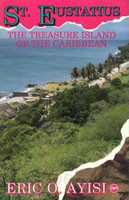Categories
Categories
Authors
Authors
ST. EUSTATIUS: The Treasure Island of the Caribbean, by Eric O. Ayisi
Product Description
The main theme of this book is a concise, lucid, ethno-historical account of a small insular community. It is intended to be an ethnographic study, albeit, eclectic in content and global in sweep. Although little is known by many historians about the island, it was the supermarket of the world in the 18th and 19th centuries, and was the bone of diplomatic contention between England and other European nations with commercial ambitions in the New World. In a heated debate in the houses of Parliament in the 18th century, Edmund Burke, describing the uniqueness of the island, said inter alia "the island was different from all the others... it seemed to have been shot up from the ocean by some convulsion, the chimney of a volcano, rocky and barren. It has no produce. It seemed to be but a later production, a sort of lasus nature, and hastily framed, neither shapen nor organized, and differing in qualities from all other. Its proprietors had, in the spirit of commerce, made it an emporium for all the world, a mart, a magazine for the nations of the earth. Its inhabitants were a mixed body of all nations and climates, not reduced to any specifics of military duty or military discipline. Its utility was its defense... It has risen, like another Tyre upon the waves, to communicate to countries and climates the conveniences and necessities of life. Its wealth was prodigious, arising from its industry and the nature of its commerce." It also deals with the important role the island played in the American Wat of Independence. The island is now inhabited by the descendants of slaves from Africa, but there are a few Americans living on the island. The past glories of this small island, small but with rich history Multus in Parvo is the theme of St. Eustatius: The Treasure Island of the Caribbean.
"This book, destined to be a classic in the field, is a pioneering and substantive text by a Ghana-born anthropologist who obtained his Doctorate from the London School of Economics and has been on the anthropology faculty of the College of William and Mary. His fresh insight and critical but sympathetic views of St. Eustatius culture and society are vividly reflected throughout this text. St. Eustatius: The Treasure Island of the Caribbean will be of immense value to scholars and laymen and to cultural/social anthropologists as well as to other social scientists." -Mario D. Zamora, Ph. D, Anthropology, William and Mary
ABOUT THE AUTHOR
PROFESSOR ERIC AYISI holds a B.Sc. (Soc.) Hons. and Ph.D. (London). he was a Research Fellow at the Institute of African Studies, University of Ghana, Legon, Ghana from 1965-74. Professor Ayisi teaches Social Anthropology and Comparative Government in the Anthropology and Government departments. He is working on a new edition of his book on African Culture published by Heinmann.
CATEGORY
Caribbean History, Politics/AFRICA
 Loading... Please wait...
Loading... Please wait... 


